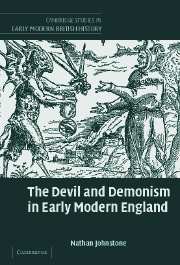Book contents
- Frontmatter
- Contents
- Acknowledgements
- 1 Introduction
- 2 The synagogue of Satan: anti-Catholicism, false doctrine and the construction of contrariety
- 3 Temptation: the Protestant dynamic of diabolic agency and the resurgence of clerical mediation
- 4 Satan and the godly in early modern England
- 5 Incarnate devils: crime narratives, demonisation and audience empathy
- 6 ‘What concord hath Christ with Belial?’: de facto satanism and the temptation of the body politic, 1570–1640
- 7 ‘Grand Pluto's Progress through Great Britaine’: the Civil War and the zenith of satanic politics
- 8 ‘The Devil's Alpha and Omega’: temptation at the cutting edge of faith in the Civil War and the Interregnum
- Conclusion
- Bibliography
- Index
- Cambridge Studies in Early Modern British History
4 - Satan and the godly in early modern England
Published online by Cambridge University Press: 23 June 2009
- Frontmatter
- Contents
- Acknowledgements
- 1 Introduction
- 2 The synagogue of Satan: anti-Catholicism, false doctrine and the construction of contrariety
- 3 Temptation: the Protestant dynamic of diabolic agency and the resurgence of clerical mediation
- 4 Satan and the godly in early modern England
- 5 Incarnate devils: crime narratives, demonisation and audience empathy
- 6 ‘What concord hath Christ with Belial?’: de facto satanism and the temptation of the body politic, 1570–1640
- 7 ‘Grand Pluto's Progress through Great Britaine’: the Civil War and the zenith of satanic politics
- 8 ‘The Devil's Alpha and Omega’: temptation at the cutting edge of faith in the Civil War and the Interregnum
- Conclusion
- Bibliography
- Index
- Cambridge Studies in Early Modern British History
Summary
How influential was this Protestant reworking of demonism? Did it effectively transcend the boundaries of academic theology to more broadly affect conceptions of the Devil and his agency? The following two chapters examine areas of culture which provide insights into the common experience of satanic agency in England after the Reformation. This chapter examines the place of the Devil in the lives of the self-conscious godly in the sixteenth and seventeenth centuries.
It was Protestantism's aspiring godly who left the most detailed first-hand accounts of diabolic experience, and it was the Puritan sub-culture of introspection and spiritual autobiography that proved the most fertile ground for the distinctive emphasis on internal temptation. Records of the experience of temptation amongst the godly are relatively plentiful because sin and despair occupied such a central place in the discourse of spiritual autobiography. The enormity of early sins served to contrast with post-conversion piety and to emphasise the escape from damnation provided by God's calling. But this does not mean that narratives of temptation are stereotyped and cannot be read as ‘real’ accounts of diabolic affliction. Whilst the demands of spiritual autobiography shaped many accounts, individual voices emerge within the framework provided by the language of conduct literature. For the godly were not merely, as John Stachniewski implies, the unreflective recipients of someone else's demonism, prone to become victims to ‘the darkness of Puritanism’ when they were unable to measure up to the exaggerated demands of Calvinist devotion.
- Type
- Chapter
- Information
- The Devil and Demonism in Early Modern England , pp. 107 - 141Publisher: Cambridge University PressPrint publication year: 2006



